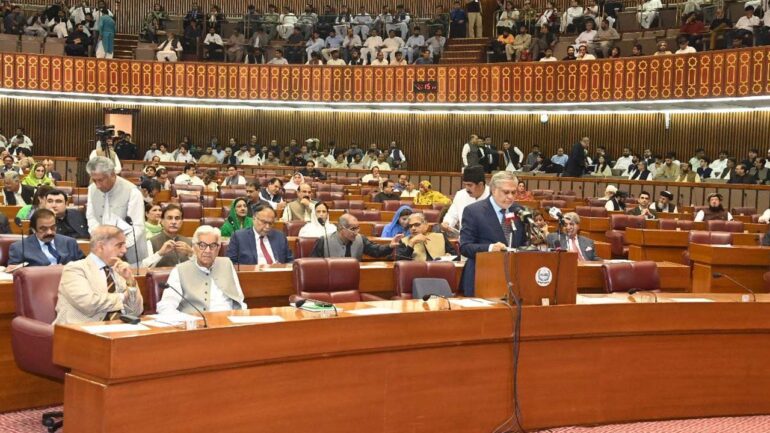The revised budget for the upcoming fiscal year sailed through the National Assembly in its session which held on Sunday and marked by a lack of quorum.
The government has made several changes, including fiscal tightening measures, as directed by the International Monetary Fund (IMF) in a last-ditch effort to secure critical funding.
The revised budget, which aims to achieve macroeconomic stability and a 3.5% Gross Domestic Product (GDP) growth rate, includes an additional Rs215 billion in tax revenue. Simultaneously, it enforces a cutback of Rs85 billion in public spending. Notably, the federal development budget and the salaries and pensions of government personnel remain unaffected by these measures.
During the session, only 70 lawmakers from the treasury benches and two from the opposition benches were present, and notable figures such as Foreign Minister Bilawal Bhutto-Zardari, Asif Ali Zardari, and the leader of the opposition, Raja Riaz, were absent.
The House rejected all amendments proposed by lawmakers from the opposition benches. Minister for Finance and Revenue Senator Mohammad Ishaq Dar moved the Finance Bill, which was subsequently passed with a majority vote after a clause-by-clause reading. The budget’s passage was met with enthusiastic desk thumping within the House.
With the Finance Bill’s approval, the budgetary process initiated on June 9 with the finance minister’s budget speech in the National Assembly has reached its conclusion. The bill now awaits the President’s assent, after which it will become law, effective from July 1, 2023.
Speaker of the National Assembly, Raja Pervaiz Ashraf, dismissed most of the proposed amendments by lawmakers, except for one by Maulana Abdul Akbar Chitrali, which was included in the bill pending Assembly’s approval.
Furthermore, the House rejected an amendment put forward by MQM member Salahuddin. The National Assembly also approved the amendments proposed by the Finance Minister in the Finance Bill 2023-24, aligning with the Senate’s recommendations.
The original bill, presented by the finance minister on June 9 for consideration, received the National Assembly’s approval with some modifications to the figures related to revenue targets and other budgetary matters for the upcoming fiscal year.
Consequently, the revenue target for the Federal Board of Revenue (FBR) increased from Rs9.2 trillion to Rs9.415 trillion, while provincial revenue increased from Rs5.276 trillion to Rs5.39 trillion. Additionally, federal government expenditures rose from Rs14.46 trillion to Rs14.48 trillion, pension volume from Rs761 billion to Rs801 billion, subsidy volume to Rs1.064 trillion, and grants volume to Rs1.405 trillion.
These measures are expected to improve the budget’s deficit and decrease the fiscal deficit by Rs300 billion.



